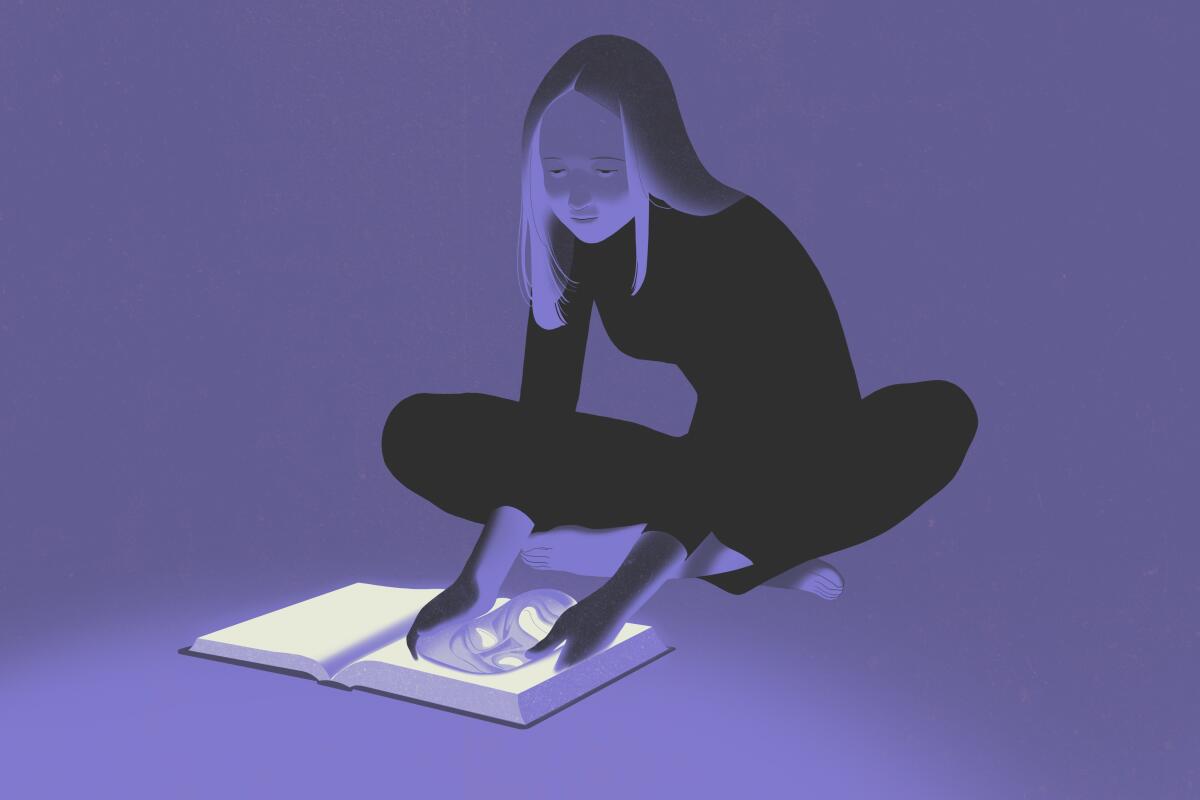A theater critic’s letter to his students, past, present and future

- Share via
To my theater students, past, present and future:
Believe it or not, the work continues.
Yes, I know you’re sitting at home, away from rehearsal, isolated from your collaborators and far removed from a live audience. You may worry that your skills are getting rusty, that your technique is losing the suppleness it may have only recently acquired.
Trust me, the work continues.
Let me tell you a story that some of you already know because we lived it together.
After six seasons of working at the McCarter Theatre in Princeton, N.J., I accepted a full-time academic post at Brooklyn College as the director of the M.F.A. program in dramaturgy and theater criticism. I began teaching in September 2001. Less than two weeks into the semester, the city was smoldering from the 9/11 terrorist attacks.
My students were just settling into their new lives as graduate students in hectic New York. Some were from foreign lands; others were from small American towns. But all of us, including jaded New Yorkers like myself, were in a state of shock.
I had some teaching under my belt, but I was a relative novice in my new role as adviser. I felt responsible for my new charges, but I also felt swept up in the fear of what might happen next. New York was waiting for the other shoe to drop. Back then, even the reasonable were paranoid.
Uncertain how to settle nerves and boost morale when I was reeling myself, I did what I always do when a public crisis demands clearer thinking: I turned to the Greeks.
The theater of 5th century BC Athens was a forum for the collision of ideas, a place for the deepest issues of the day to be thrashed out in public. Against a backdrop of forces greater and more mysterious than any human being can comprehend, protagonists in ancient Greek drama are forced to make irrevocable choices, which reveal not only character but moral and existential truths.
The German philosopher Hegel thought Sophocles’ “Antigone” was the high-water mark of classical tragedy for the way it elegantly dramatized the conflict between equally justified claims. Melodrama pits right against wrong, but tragedy is a matter of right against right — in this case, Antigone’s duty to burying her dead brother, slain while waging war against the city, and Creon’s obligation as leader to uphold the rule of law.
Whether or not you buy the Hegelian theory of tragedy, it’s indisputable that the ancient tragedians were drawn to dramatic situations that didn’t have obvious solutions. If there’s a common thread in the divergent art of Aeschylus, Sophocles and Euripides, it is in their shared commitment to complexity — to wrestling with contradiction, ambiguity and indeterminacy in matters of the gravest import.
Whatever powers of analysis I may have developed as a drama critic, they came from my immersion in the Greek canon. The plays taught me to see drama as a structure of gripping argument. But they did something else that I only appreciated after I became a teacher: They initiated me into a body of wisdom that is the special preserve of a theater education.
I have a confession to make. I was not a theater kid. After hamming it up as the star of a fifth-grade play, I never acted again on stage. The idea of majoring in theater in college never even crossed my mind, not that my parents would have permitted it. I recall a few Broadway outings as a kid, but my love of theater developed in secret, through reading.
My father was not what anyone would call a sensitive type. He has mellowed in his 80s, but he was turbulent, quick-tempered and not tolerant of a son he must have suspected early on was gay. My relationship with him was colored by fear. He wasn’t a reader, by any means. But in the basement, he had a stash of college books that he felt were worthy of keeping. Among these were paperback volumes of plays by Ibsen and Chekhov.
I read these plays in high school, drawn first to the Ibsen anthology by the repeated commercial on the New York local channel WPIX for the 1973 film of “A Doll’s House” starring Jane Fonda. (Nora’s climactic scene with Torvald, when she explains the reason she must end their marriage, was on an endless loop during my adolescence, which was spent doing homework in my bedroom before a squat, black-and-white television with sketchy reception.) The Chekhov collection had its own allure, quite possibly because my father expressed a reverence for the great Russian writers, a sentiment he gave voice to perhaps two or three times at most in my childhood but which left an indelible impression for being so out of character.
Jane Fonda’s emancipated voice as Nora, my father’s musty books in the cellar — these were the seeds of my theatrical profession. I won’t bore you with the story of how I wound up at NYU’s business school — “consummate miscasting,” my adviser at the Yale School of Drama waggishly commented. But it was after my uncle died from AIDS-related complications that I decided to take my life into my own hands and switch tracks to what was temperamentally a much more congenial fit, playwriting and dramatic literature.
The theater literally saved my life. Overwhelmed by an epidemic that was mowing down my newly discovered community, I took refuge in reading, writing and playgoing, all of which assured me I wasn’t alone in the world.
Fast-forward to my time as an assistant professor of drama at Brooklyn College in that week when classes finally reconvened after 9/11. “The Oresteia” was on the syllabus, and glimpsing the hand of fate, I proposed that we proceed as planned. I could think of nothing better than devoting the next few weeks to studying Aeschylus’ trilogy, which thrillingly dramatizes the nearly impossible demands that justice places on us as citizens.
In the wake of appalling terrorism, we gathered to contemplate a series of plays about vengeance and the cycle of violence it inexorably sets in motion. The conflicts Aeschylus dramatizes haven’t become easier to sort out in the 2,500 years since the plays were written. My students and I embarked on the questioning journey of Greek tragedy at a time when vindictive certainties were understandably on the rise.
It was a privilege to ponder dramatic masterworks that inspired not just future theater artists but also philosophers, psychologists and poets. The theater is sometimes dismissed as lightweight, a playground for hams, but writers as great as Nietzsche, Freud and Keats knew better.
Keats, to take one example, developed his idea of negative capability — the capacity to tolerate “uncertainties, mysteries, doubts,” without the need to overextend half-knowledge — partly through the example of Shakespeare. Drama, which builds from the clash of perspectives, conditions a pattern of thinking that is suspicious of ideology. Irony and flux are fundamental laws of the theatrical universe.
Given the state of our politics, we could all use a crash course in this kind of analysis. Ever skeptical of conventional wisdom, the theater at its best breeds a healthy respect for dissent. It teaches the difference between sentiment and sentimentality. And inclusive in its scope, this ancient art form asks us to accept that a secular space, a place for democratic reckoning, can also be a spiritual refuge, a sanctuary in which to contemplate the mysteries of being.
Yes, our performing arts venues are closed. But as Samuel Johnson observed, “A play read affects the mind like a play acted.” The separation that has been forced upon us by the COVID-19 pandemic needn’t bar anyone from communing with the minds of those theater artists from whom our most enduring values have derived.
This semester I’m teaching a playwriting workshop at the California Institute of the Arts. Students are writing short plays, but I’ve been assigning various writing exercises to limber them up. I asked them to read three Chekhov short stories (“The Darling,” “The Lady With the Pet Dog” and “The Bishop”) and adapt a scene from one or more of the works in either a faithful or freehand manner.
The selection of stories was somewhat arbitrary. My goal wasn’t so much to introduce the students to specific works as to provide them an opportunity to absorb an essential sensibility. I wanted to expose them to an artist who recognizes the muddle of human nature. A writer who can zero in wryly on psychological quirks while never losing sight of the shifting expanse of indifferent sky.
Great literature, as Chekhov illustrates in his plays and short stories, is where simplistic binaries die. Characters live personal lives while contending with political miseries. They meditate on metaphysical conundrums while fixing the evening meal. These lessons seem to me more valuable than anything I could teach.
When the workshop resumed via Zoom, the students began reading their adaptations. Our lives are upended, but we had the chance to bolster our humanity through the communal intelligence of theater and through the gracious act of creation.
Writing and teaching are my only skill sets. My gratitude to heroes on the front lines of this pandemic is boundless. As ambulances resound in my neighborhood, part of me wishes I could do more to help than social distancing. But in connecting with my students via Zoom and through my writing here, I have begun to feel a resurgence of pride in being able to share how the theater has sustained me. Your paths are your own, but I have faith that the theater still has the power to sustain you who have similarly heeded the call.
The work continues — especially now.
More to Read
The biggest entertainment stories
Get our big stories about Hollywood, film, television, music, arts, culture and more right in your inbox as soon as they publish.
You may occasionally receive promotional content from the Los Angeles Times.











